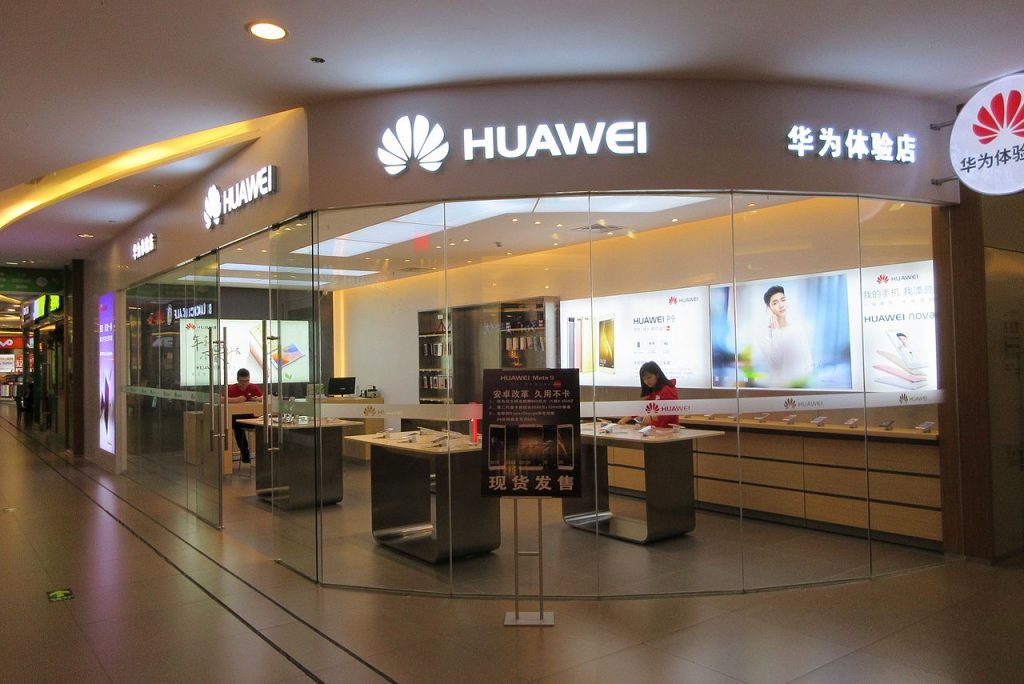
SZ zh:深圳北站 Shenzhen North Station 東廣場 East Square 繽果空間購物中心 Bingo Space Shopping Center shop sign in Feb 2017
Communist China’s huge telecom company makes headlines every day: Trump cracks down on Huawei, or, Commerce Department issues rule against Huawei, or, 5G network rollout delayed. Stock markets swoon with each dire report. So what’s going on? And is it really important to our national security?
Understanding why the battle with Huawei involves U.S. national security requires a little history. It begins during the Cold War, and the need of western allies for the ability to read Soviet Russia’s electronic mail. Beginning with simple intercept radios, a complex system evolved that ultimately consisted of computers, satellites, cable networks, antenna arrays, towers and server farms that could read everyone’s mail. It was code-named Echelon, and the intelligence it gathered was ultimately shared by the U.S., Great Britain, Canada, Australia, and New Zealand — an English-speaking group known as “5 Eyes.”
Today, electronic intelligence gathering has been further complicated by the Internet, by the astounding proliferation of cell phones, and by the simple fact that the United States is no longer the center of global communications. Nevertheless, organizations like the National Security Agency continue to monitor electronic communications and our tech companies have grown to be world leaders in innovation, from software to chips to cell phone systems. Recognizing the significance of that progress, China has been playing catch-up for decades. Enter Huawei.
Huawei, the tip of Beijing’s telecoms espionage spear, was founded in 1987 by a former member of the Peoples Liberation Army’s Information Technology Department. Ren Zhengfei’s online biography is carefully groomed to avoid mention of his military rank or affiliation with China’s Communist Party. He cheerfully insists Huawei is an “independent” company in a communist country, and that he would deny a request by the Chinese government for any intelligence Huawei may acquire from its international business. No one takes that statement seriously.
Huawei manufactures antenna towers, core switchgear, fiber optic cables, and everything else that computers and cell phones need to connect to the global Internet via the anticipated 5G network. That includes equipment at switching points where all information and data is routed to its destinations. That “core” equipment would have access to everything that goes through it, including traffic from the LTE/4G system we use today. Huawei’s plan is simple: sell everything needed for a 5G system at very attractive prices, including that essential core equipment –- which has “backdoors” that would allow Huawei to read everyone’s electronic mail. Huawei’s goal is just as simple: have the world pay them to install and maintain a Chinese 5G spy system. But as we are now seeing in news reports, China’s simple strategy to dominate global communications has serious weak points.
First, when a few countries began to buy Huawei’s 5G equipment, the Trump administration woke up. Washington then made it clear that any country that installed Huawei core equipment, especially the 5 Eyes partners, would be immediately cut out of intelligence sharing with the United States. 5 Eyes got the message, and only the British decided to buy some safe non-core Huawei equipment.
Second, Huawei is not technologically self-sufficient and, like most of China’s hi-tech companies, it depends on importing key parts and services from Silicon Valley. Upending seven decades of putting business with China first and U.S. interests second, the Trump administration did two things to end Huawei’s global espionage threat.
On May 15thPresident Trump signed an Executive Order prohibiting American firms from buying any telecoms products and services from “foreign adversaries” because they constitute “an unusual and extraordinary threat to the national security.” Though the foreign adversaries were not named, they are communist China and its telecoms giant, Huawei.
Immediately after the Executive Order was announced, the Commerce Department cleared up any doubt about who those “foreign adversaries” might be by issuing a rule prohibiting the sale of all American parts and services to Huawei and 68 of its affiliates and subsidiaries.
A similar rule came close to bankrupting ZTE, Huawei’s smaller Chinese cousin. It was issued because ZTE evaded U.S. sanctions by selling products to Iran that included software and hardware from Microsoft, HP, Oracle, Dell, Cisco, and Symantec. The ban was lifted in March 2017 after ZTE admitted guilt, paid a $1.2 billion fine, and agreed to being monitored by a compliance officer.
Such a settlement by Huawei would be a serious setback to China’s plan for global dominance, so there’s little chance of it happening. Yet. Meantime, the Chinese politburo is reassessing a strategy that has caused major disagreement amongst its members, a conflict that has put the U.S.-China trade deal in limbo. Politburo hardliners and softliners (yes, communist China has them too) are now arguing among themselves about whether they should outwait the Trump administration, hoping for Trump’s defeat in 2020, or make a deal that recognizes that China exports more than four times as many goods to America than we export to them, and that their staggering economy will not take the added strain of a prolonged trade war.
What happens next? At this early date, the outcome of the struggle is clouded by too many disparate factors to be labeled as certain. Nevertheless, a list is a useful telescope to help us see and understand what President Trump and trade representative Lighthizer are now doing:
- China outwaiting the Trump administration is a bad idea. Both parties in Congress and the media are united in their understanding of the existential threat that China poses to the United States, despite the efforts of the China Lobby. The American public is becoming aware of that threat too, and when Confucius Institute Centers begin to be disinvited by U.S. universities, Beijing will get the message that soft power has its limits.
- The Chinese economy is entering a recession, and the U.S. economy is vibrant. Both will be hurt by trade and tariff fights, but China will hurt much more. If Washington carries out planned tariff increases, the Chinese economy will be pushed even deeper into recession, or worse.
- The Chinese Communist Party is obsessed by only one thing: maintaining power. In an effort to avoid the fate of the communist party of Russia, the Beijing politburo made a detailed study of the fall of Soviet Russia. They concluded that to remain in power they must build a surveillance system that will record the biometric data of every one of China’s 1.4 billion citizens, and that will monitor their every movement. They believe that such a control system, based on a 5G network and artificial intelligence, will give them the power to avoid another Tiananmen Square uprising.
But Trump and Lighthizer know that the collapse of the Soviet empire was caused by the U.S. pushing a deteriorating Russian economy to the point of failure. In similar fashion, they intend to end the existential threat from a nascent Chinese communist empire by using the power of American productivity in hi-tech, space, agriculture, mining, and heavy industry.
To paraphrase President Ronald Reagan, China will lose, and we will win.
























